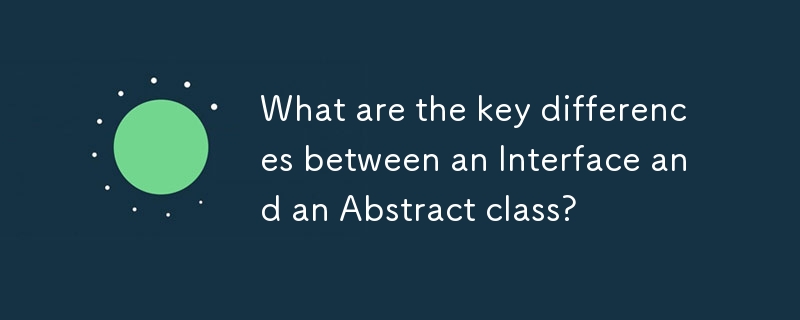What are the key differences between an Interface and an Abstract class?

Interface vs Abstract Class
Interface
- 100% abstraction (prior to Java 8).
- Can have default/static methods (Java 8 ).
- No constructors.
- Multiple inheritance allowed.
Abstract Class
- Partial abstraction.
- Can have constructors and fields.
- Single inheritance only.
Examples
Interface
interface Animal {
void makeSound(); // Method declaration
}
class Dog implements Animal {
public void makeSound() {
System.out.println("Bark");
}
}
Abstract Class
abstract class Vehicle {
abstract void start(); // Abstract method
void stop() {
System.out.println("Vehicle stopped"); // Concrete method
}
}
class Car extends Vehicle {
void start() {
System.out.println("Car started");
}
}
When to Use What?
Use Interface When:
- You need to define a contract for unrelated classes.
- Multiple inheritance of type is required.
- You want to provide default or static methods without affecting the implementing classes.
Use Abstract Class When:
- Classes share a common base and need to share code.
- You want to provide some implemented methods and enforce others to be overridden.
- You need constructors or non-constant fields.
Conclusion
Both interfaces and abstract classes are powerful tools in Java, and choosing between them depends on your application's needs. Use interfaces to define behaviors across unrelated classes and abstract classes for shared code in a class hierarchy.
By understanding their differences and strengths, you can write cleaner and more maintainable code. Happy coding! ?
The above is the detailed content of What are the key differences between an Interface and an Abstract class?. For more information, please follow other related articles on the PHP Chinese website!

Hot AI Tools

Undresser.AI Undress
AI-powered app for creating realistic nude photos

AI Clothes Remover
Online AI tool for removing clothes from photos.

Undress AI Tool
Undress images for free

Clothoff.io
AI clothes remover

AI Hentai Generator
Generate AI Hentai for free.

Hot Article

Hot Tools

Notepad++7.3.1
Easy-to-use and free code editor

SublimeText3 Chinese version
Chinese version, very easy to use

Zend Studio 13.0.1
Powerful PHP integrated development environment

Dreamweaver CS6
Visual web development tools

SublimeText3 Mac version
God-level code editing software (SublimeText3)

Hot Topics
 1378
1378
 52
52
 How does Java's classloading mechanism work, including different classloaders and their delegation models?
Mar 17, 2025 pm 05:35 PM
How does Java's classloading mechanism work, including different classloaders and their delegation models?
Mar 17, 2025 pm 05:35 PM
Java's classloading involves loading, linking, and initializing classes using a hierarchical system with Bootstrap, Extension, and Application classloaders. The parent delegation model ensures core classes are loaded first, affecting custom class loa
 How do I implement multi-level caching in Java applications using libraries like Caffeine or Guava Cache?
Mar 17, 2025 pm 05:44 PM
How do I implement multi-level caching in Java applications using libraries like Caffeine or Guava Cache?
Mar 17, 2025 pm 05:44 PM
The article discusses implementing multi-level caching in Java using Caffeine and Guava Cache to enhance application performance. It covers setup, integration, and performance benefits, along with configuration and eviction policy management best pra
 How can I use JPA (Java Persistence API) for object-relational mapping with advanced features like caching and lazy loading?
Mar 17, 2025 pm 05:43 PM
How can I use JPA (Java Persistence API) for object-relational mapping with advanced features like caching and lazy loading?
Mar 17, 2025 pm 05:43 PM
The article discusses using JPA for object-relational mapping with advanced features like caching and lazy loading. It covers setup, entity mapping, and best practices for optimizing performance while highlighting potential pitfalls.[159 characters]
 How do I use Maven or Gradle for advanced Java project management, build automation, and dependency resolution?
Mar 17, 2025 pm 05:46 PM
How do I use Maven or Gradle for advanced Java project management, build automation, and dependency resolution?
Mar 17, 2025 pm 05:46 PM
The article discusses using Maven and Gradle for Java project management, build automation, and dependency resolution, comparing their approaches and optimization strategies.
 How do I create and use custom Java libraries (JAR files) with proper versioning and dependency management?
Mar 17, 2025 pm 05:45 PM
How do I create and use custom Java libraries (JAR files) with proper versioning and dependency management?
Mar 17, 2025 pm 05:45 PM
The article discusses creating and using custom Java libraries (JAR files) with proper versioning and dependency management, using tools like Maven and Gradle.





